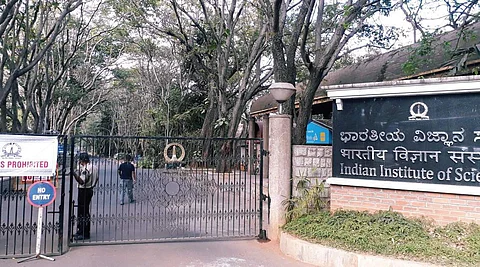

Dhriti Chengappa (name changed), a researcher, allegedly endured more than five years of sexual harassment during her postgraduate study at IISc. It allegedly started when she worked on a project between her postgraduation and PhD. The professor overseeing the research bombarded her and the other women in the group of junior researchers with crude and humiliating sexual comments. She couldn’t do anything but bear the entire harassment all through the five years, says Dhriti. However, she is not alone. Late-night research, isolation and a strict, male-dominated hierarchy are the perfect conditions for sexual harassment, say students at IISc.
According to sources, there are around 8 to 10 cases of sexual harassment under the institute’s internal committee. Most cases were reported in 2015 and 2016. However, when contacted, Dipshikha Chakravortty, associate professor and a member of the Internal Complaints Committee of Indian Institute of Science, Bengaluru, declined to comment on the issue.
Many students, who wished to be anonymous, said there are many cases of harassments which happen in the institute’s campus. However, many of them shun from lodging an official complaint due to various issues including threats to their career or delay in finishing their pursued courses.
One such student from Nano-Science Department says, “I was harassed by a professor. I approached the authorities, the department head. All that he did was called the accused for an enquiry and was just let go with a warning. Nothing happened after that. However, I had no option but to continue working under the same mentor or I had to quit my degree. I chose to continue. Now, all that I do is I don’t go to the lab when he is there. I work from my room.”
According to her, it’s been two years since this happened and she claims that she still hasn’t got any justice. She also says that her’s was not the only allegation against that professor. There have been many students who have complained against him.
Several students from the alumni claim that such incidents are quite frequent within the campus. A student says young female academics and students are particularly vulnerable due to the structure and hierarchy of lab working, “You [may] have privileged access to facilities or equipment or a particular dataset, and that access comes through that supervisor [who is harassing you]. I’ve heard of cases where students have put complaints in and then been told they need to change projects. It’s the student that takes the hit for speaking up."
They claim that action is taken against the erring professors only if there is a personal agenda behind sacking that person. Another student said, “Management supports most of the professors and institute just cover up the matter as there is also the question of “prestige of the institution”.”
But the main reason for their reluctance to make a formal complaint was doubts that being a junior woman in a small, male-dominated field. A student from the department of physics said, "I’m applying for jobs and really hoping they don’t know what happened at my institution. If I’m known as a ‘troublemaker’ they won’t want me. In a lab group, there’s a very hierarchical system and they can prevent you from doing your own work. They can be very buddy-buddy – it’s not like a big office, where a manager may have more of an unbiased stance.”
The girls claim that there are pages and pages of the university’s policy on harassment and how to get the counselling but what happens after one reports is utter harassment.
However, a senior professor from the IISc on condition of anonymity said, "I don’t decline that there might be genuine complaints about harassment but there are many orchestrated ones too. In some of the cases, I have myself seen girls accusing professors of sexual harassment when they don’t get their papers, which are really not worthy of publishing, withheld from publication,”
However, students feel that the hierarchy, working environment and male-dominated culture of science, not only in their university but in their discipline, makes tackling sexual misconduct more complex and challenging than in other academic fields and industries.
(with inputs from Tania Thomas and Akram Mohammed)
